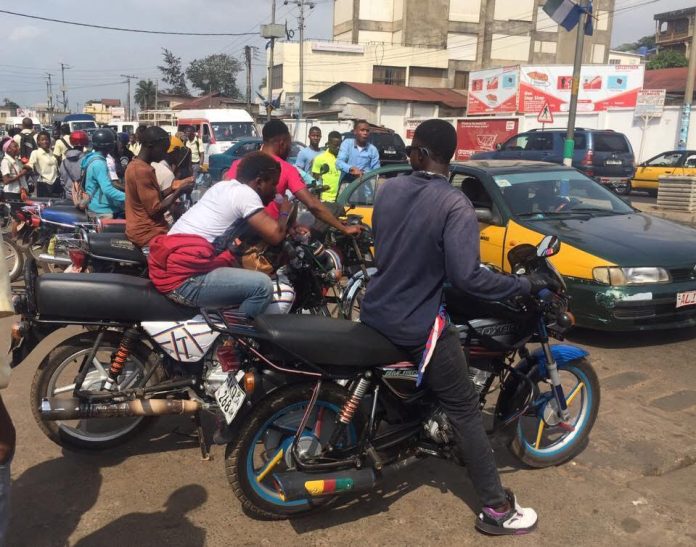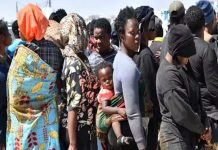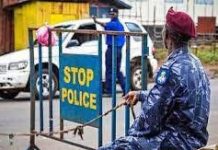By sahr Ibrahim Komba
“225 is now a part of my daily meal. I cannot go a day or even ride my bike without taking 225,” said Ansu (not his real name), a commercial bike rider navigating the steep, rocky terrains of Mayenkineh Road in Calabatown, eastern Freetown.
Ansu’s story is far from unique. He claims that “99.9% of commercial bike riders take 225 to boost stamina and endurance. It’s the only way we survive the day.”
Known on the streets as “225,” Tramadol is a powerful opioid analgesic, typically prescribed for moderate to severe pain following surgery or injury. In Sierra Leone, however, it has slipped beyond medical control and found its way into the black market fueling a dangerous culture of chemical dependency, particularly among young men in physically demanding jobs.
The riders of Mayenkineh Road, who are prohibited from entering the Central Business District (CBD), operate instead in peripheral zones with poor infrastructure. For many, 225 is their only coping mechanism.
“We don’t have any option. Mayenkineh is safer for us. The only thing that keeps us going is our dear 225,” Ansu confessed.
While Tramadol is used in hospitals, health experts warn against its non-prescribed and prolonged use. Its side effects are severe: seizures, hallucinations, respiratory depression, suicidal ideation, adrenal malfunction, dizziness, and mental depression. The risks intensify with excessive or long-term intake conditions common among abusers.
Despite these warnings, many like Ansu either do not know or deliberately ignore the health consequences. The drug is often combined with alcohol, energy drinks, or other substances like Kush, amplifying the dangers and pushing users into deeper addiction.
Authorities and medical professionals have linked Tramadol abuse to mental illness, violence, family breakdowns, and increasing school dropouts. The drug’s accessibility on the streets and at key transit points unchecked by regulation or monitoring makes it a tempting option for Sierra Leone’s struggling youth.
Sierra Leone’s public health system was already fragile before the rise in synthetic drug abuse. The country has less than one psychiatrist per 100,000 people, and fewer than five functioning addiction treatment centers nationwide.
A community health physician in Freetown who decided to be anonymous notes that even when patients seek help, “there’s no sustainable rehabilitation system. We treat symptoms, but without follow-up or reintegration support, they relapse within weeks.”
She adds: “We’re seeing young people coming in with multiple organ failure, hallucinations, and trauma-induced psychosis. Some are as young as 13.”
Despite government initiatives to combat the growing crisis, the abuse of Tramadol, particularly the 225 mg capsules, has spiraled out of control. Every district, chiefdom, section, and village across Sierra Leone is affected. The drug has become so widespread and normalized that it now touches every social stratum.
Security agencies, police, and even civilians have intercepted significant quantities of 225 and “kuah” (likely kush) at checkpoints and seaports, particularly the Queen Elizabeth II Quay.
Just this year, TOCU and customs officials destroyed 472 cartons of tramadol weighing over 1,200 kg. In June 2025, authorities in Tokeh seized more than 16 gross and additional packets of suspected Tramadol. Most recently, a cross-border operation at Gbalamuya on July 28 led to the arrest of a man in a Guinean-registered vehicle with 79 packets of 225.
In rural areas such as Sandor Chiefdom in Kono District, the drug’s grip is even more disturbing. Empty Tramadol capsules litter village paths and farm fields, and even in communities with fewer than 500 residents, use is rampant.
“Young men take five or more tablets a day,” one woman said. “Some only ride their bikes after taking 225, others use it to boost energy or as a sexual stimulant.”
Another woman recounted a case of severe illness after unknowingly sipping her son’s energy drink, likely mixed with the drug. During a recent funeral in the region, mourners openly discussed their use of Tramadol citing pain relief, performance enhancement and for more personal reasons.
In a startling revelation, some youths have even sought guidance from religious leaders on the use of Tramadol during Ramadan. One Iman replied, “Whether during Ramadan or not, Tramadol should only be taken on the advice of medical experts” a sign of how deeply embedded the problem has become.
Tramadol is not alone. The synthetic drug “kush” continues to devastate communities. Often laced with nitazenes opioids reportedly 25 times more potent than fentanyl and synthetic cannabinoids, kush has turned addiction into a national emergency.
In 2024, the government declared a state of emergency over the kush epidemic, establishing a multi-sector task force to address prevention, treatment, and enforcement. Despite these efforts, addiction has overwhelmed health systems and torn families apart. Some communities have resorted to chaining addicts to prevent relapse or flight, a troubling echo of outdated psychiatric methods.
What began as a medically sanctioned painkiller has evolved into a potent agent of social decay. Addiction to 225 and the broader synthetic drug crisis is robbing Sierra Leone’s youth of their vitality, health, and future.
An Elder community members describe the situation as “disastrous,” with addiction now regarded by some as a norm. The consequences reach beyond health impacting education, security, economic productivity, and community cohesion.
Experts and stakeholders warn that reversing the tide requires comprehensive and sustained interventions:
Disrupt illicit supply chains by targeting cartels and smugglers distributing Tramadol and kush.
Expand access to treatment and rehabilitation, especially through community-based centers with professional medical support.
Implement widespread public education campaigns to inform youth and families about the dangers of drug abuse.
Another way to address the said problem is to engage community leaders, religious figures, and civil society to tackle the root causes of drug dependency, such as poverty, unemployment, and untreated mental health issues.
As riders like Ansu brave the unforgiving roads of Freetown, powered by a little white capsule, the nation stands at a crossroads. The crisis is not just about drugs it is about the health, dignity, and future of Sierra Leone’s next generation.
If left unaddressed, the abuse of 225 and other synthetic opioids could undermine the nation’s social fabric for decades to come.





